Jan 2015
Vulnerable seal pup is regular visitor to Lincoln Park
Jan/26/15 08:28 AM
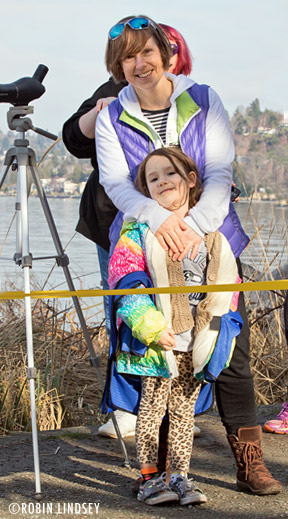
Before support volunteers were able to arrive to help monitor the perimeter, there were 5 overt breaches - walkers with dogs and runners cut through the well-marked tape barrier with “Do Not Enter” and “Resting Seal Pup” signs. Each was insistent that they had not disturbed the seal. Another man was emphatic that he wanted to go in and stand close to the seal again, as he had done before Seal Sitters MMSN arrived.
NOAA recommends a distance of 100 yards from marine mammals and they are protected from harassment by Federal and WA State law. Undisrupted, stress-free rest is crucial to the survival of seal pups who have a 50% mortality rate their first year. Colman is terribly unresponsive to people standing within feet of him - and that is of great concern and may well indicate underlying health issues. Just because Colman does not react, does not mean he isn’t stressed at such close activity. Seal Sitters MMSN is closely monitoring his health and behavior.
Of grave concern is the fact that Colman is extremely vulnerable to injury from the many illegally off-leash dogs that are at Lincoln Park and on the beaches each and every day. There is no way Colman could escape. Dog behavior cannot be predicted and each, regardless of breed, should be considered a danger to a struggling seal pup.
Seal Sitters volunteers like Laura and daughter Cyrilla (photo) helped keep the pup safe until he (or she) returned to the Sound around 2pm. Thanks to the many volunteers who educated hundreds of people and protected Colman on a gorgeous and busy day at the beach.
At 5pm, Seal Sitters’ first responder investigated a report of a pup at the north end of the park. Due to darkness, she was unable to confirm if the pup was Colman. The pup returned to the water at 5:40.
Please, if you see Colman or another seal pup at Lincoln Park, keep people and dogs well away and call our dedicated hotline at 206-905-SEAL (7235).
Healthy gray whale killed by ship propeller
Jan/25/15 05:07 AM
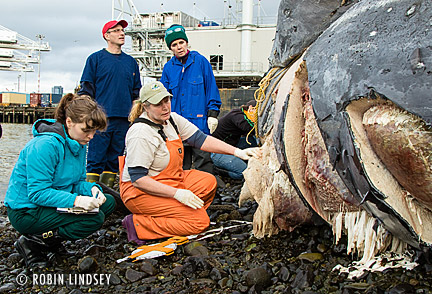
Yesterday, a necropsy exam was performed by biologists from NOAA’s marine mammal stranding network, led by Cascadia Research and Washington Department of Fish and Wildlife with support from interns, marine mammal vets and volunteers from Sno-King MMSN and Seal Sitters MMSN.
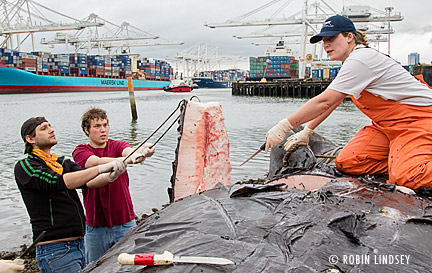
A thick, oily layer of blubber (right) and food in the intestines indicated the two - three year old whale was in excellent health. It is a bit unusual for a gray whale to be inside Puget Sound in January. The gray was assumed headed south to Baja California’s warm winter breeding grounds after a successful season feeding in the rich waters of Alaska’s Bering and Russia’s southern Chukchi seas. Watch a video here that shows typical feeding behavior of a gray whale, scooping up large mouthfuls of ocean sediment and straining invertebrates through a comb-like filter of baleen. In the spring, on their 10,000 mile roundtrip migration back north, it is common for gray whales to venture into inland waters to feast on ghost shrimp around Whidbey Island.
Washington State averages about a half-dozen gray whale strandings each year. Thanks to the Port of Seattle for providing a secure location to perform the examination. The whale will be sunk to decompose and nourish the marine ecosystem.
Read Seal Sitters “Gray Whale Facts” here.
Seal pup Colman makes a return appearance
Jan/21/15 08:07 PM
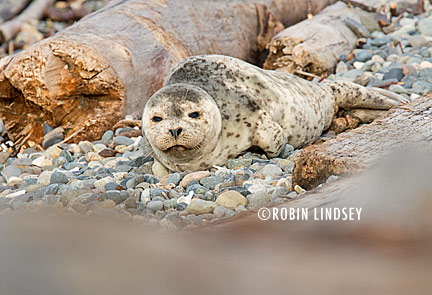
Because the pup was practically on the walk, cooperative passersby were diverted around the pool building so that he could rest relatively undisturbed. Most everyone was fine with the detour, however, a few people ignored the yellow tape. Volunteers explained that marine mammals are protected by Federal and Washington State law - NOAA recommends a 100 yard distance when viewing them, both in and out of the water. This is to avoid disrupting foraging and health needs. Disturbance is considered harassment and is punishable by fine. It is critical that seal pups get sufficient rest and are able to warm up out of Puget Sound’s frigid waters.
Colman slept throughout the day, as ferries passed back and forth to Vashon against the backdrop of the Olympic Peninsula. He finally returned to the Sound about 4:45pm. As dusk fell, seasoned young Seal Sitters volunteers Stella and Ruby helped take down the tape perimeter. Thanks to the many volunteers who put in very long hours today to make sure that Colman was safe.
This is a reminder that dogs are not allowed on beaches (leashed or unleashed) at Lincoln Park - or for that matter, ANY public beach in West Seattle. Today, a number of people were asked to please put their dogs on leashes and leave the beach. Each year in Puget Sound, dogs attack and seriously maime - or kill - vulnerable seal pups who cannot move quickly enough to escape. Please, share the shore with seal pups!
As always, if you see a seal pup on the beach, please stay back and call the Seal Sitters hotline immediately at 206-905-SEAL (7325).
Beautiful day brings out sunworshipers of all species
Jan/20/15 06:37 PM
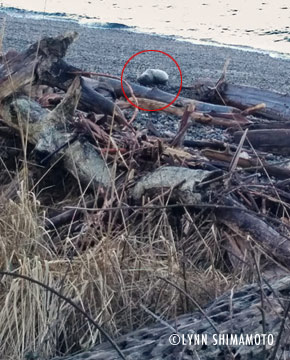
Seal Sitters’ Scheduler for the day Abigail quickly began calling volunteers, lining them up in shifts to help protect the pup. Laura was first to show up for duty with 2-year old Rhydian and super-kindergartener Cyrilla, who excitedly helped Lynn stretch a yellow tape perimeter between cones and barricades. Soon after, volunteer Victoria arrived to distribute educational materials and talk to fascinated onlookers, explaining that all seal pups in Puget Sound are weaned and have been on their own for many months now.
As two bald eagles circled in the deep blue sky high above them, many people (including a group from a Wallingford retirement home) stopped to marvel and learn a bit about seal biology and pups’ need to rest undisturbed.
Just before noon, the pup stirred and stretched. He started making his way toward the tideline and slipped away into the choppy water. Volunteers remained on site for about 20 minutes to make sure he didn’t return to the beach. With no sign of the pup, they gathered materials and hiked back out of the park. Thanks to everyone who helped today!
March at Alki on Saturday to help free captive orca Lolita
Jan/13/15 10:38 AM
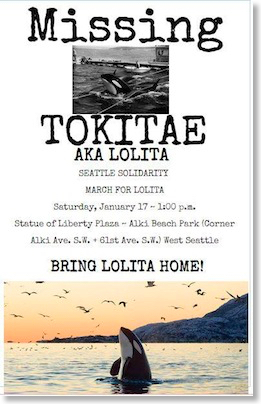
Lolita, also known as Tokitae, is one of approximately 50 orcas taken from Washington waters in a deadly roundup, some of whom died during capture. Torn from her family, she has languished in captivity and isolation, performing daily in a small tank, for the last four decades.
People around the world will be marching on Saturday, continuing to apply pressure for her release. Read the plans for her return to the Northwest on OrcaNet. Read more about the event here.
Seattle Solidarity March for Lolita (event Facebook page)
When: Saturday, January 17th at 1pm
Where: Statue of Liberty Plaza at Alki Beach, West Seattle
(intersection of Alki Avenue SW and 61st Ave SW)
The release of the documentary film Blackfish exposed the dirty secrets of large cetacean captivity to a global audience, sparking outrage. Please, turn out in full-force for this event and show the world that residents of the Northwest will never forget the dark days of orca seizure and captivity - and in hopes we can prevent future ones. Help free this beautiful, intelligent and highly social being from her life of misery. Bring Lolita home.
UPDATE
Read Seal Sitters MMSN co-founder and nature writer Brenda Peterson’s informative and passionate Huffington Post article on the world-wide march and captive orcas here.
Rescue of seal pup challenges first responders
Jan/07/15 08:15 AM
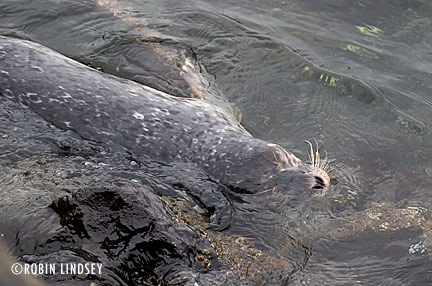
Returning briefly to her car to escape a drenching downpour, Robin peered through the window with steamy binoculars and noticed a hint of movement in the waves underneath the cement overlook. It was the harbor seal pup, listless in the swells surging against the rocks.
This pup, floating just offshore in the deep water, was obviously in dire straits. Over the next 90 minutes, she observed the odd behavior of the inaccessible, struggling pup who opened her eyes only briefly during that entire time, even when battered on the craggy point. Robin called fellow First Responders Lynn and David to plan and participate in a tricky and precarious capture attempt. Disappearing at times and too weak to haul out onto the rocks to rest, the pup finally became wedged into the base of the rocks by the rising tide. If Seal Sitters was going to be able to capture her, this was our brief moment of opportunity.
All three volunteers carefully maneuvered down the slippery, steep rocks below the sea wall. At the base, Robin positioned a large net behind and underneath the exhausted pup, half-draped into the somber, gray water. After letting the pup rest for a few minutes, she was scooped into the net and carried high up onto the grass above. The female pup was gently transferred into a kennel and driven to PAWS Wildlife Center for stabilization and assessment, but we are sad to report that she died overnight.
The pup will be necropsied by WA Department of Fish and Wildlife Marine Mammal Investigations in hopes of determining cause of death. We will follow up and post the results of that exam.
Seal Sitters MMSN would like to commend the man who stopped his truck and questioned our authority to handle a marine mammal. He was assured that we are indeed contracted members of NOAA’s West Coast Marine Mammal Stranding Network and, as such, are authorized to examine and transport a seal to a rehabilitation center for treatment. Seal Sitters MMSN would like to remind everyone that ONLY members of the Marine Mammal Stranding Network - or their assigned agents - have this authority. Any member of the public that feeds, touches, moves or disturbs a marine mammal can be fined and/or prosecuted under the Federal Marine Mammal Protection Act (MMPA) and Washington State law.
Seal pup rests on a foggy morning
Jan/06/15 04:31 PM
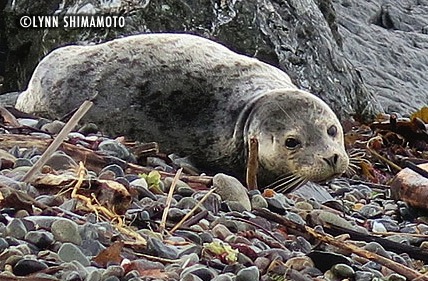
Because the pup was so close to onlookers and so alert to the disturbance, access to that small section of sidewalk was eventually closed off and pedestrians and cyclists were instead funneled around the back of Colman Pool. The public was quite amicable to giving the pup, nicknamed Colman, some quiet time. Everyone was more than willing to go just a little out of their way to ensure he could rest and warm up - and not be scared back into Puget Sound.
Around 10:30, Colman made his way to the tideline and swam off. After numerous storms the past week, there was quite a bit of woody debris just offshore and the pup tried unsuccessfully to crawl up onto some floating driftwood. Finally, he succeeded in wriggling up onto a very long pole which was drifting north along the beach. As volunteers walked out of the park, they saw hitchhiker Colman, still perched on his safe vessel, sail off into the fog.







